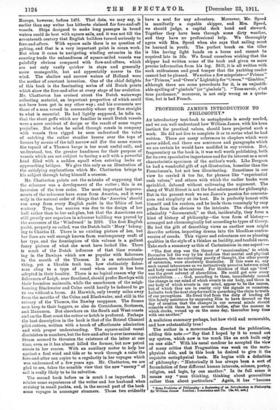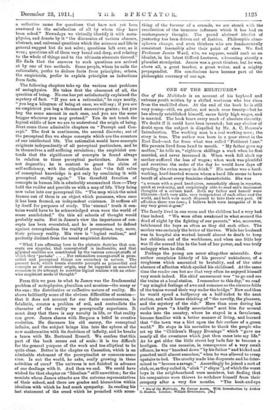PROFESSOR JAMES'S INTRODUCTION TO PHILOSOPHY.* AN introductory text-book to metaphysics
is sorely needed, and we can well understand bow William James, with his keen instinct for practical values, should have projected such a work. He did not live to complete it or to revise what he bad written. There are many references to chapters which were never added, and there are sentences and paragraphs which we are certain he would have modified in any revision. But, fragmentary as the book is, it was well worth publishing, both for its own speculative importance and for its interest as a most characteristic specimen of the author's work. Like Bergson he had a wonderful gift of apt illustration, homelier than the Frenchman's, but not less illuminating. Sometimes in our view he carried it too far, for phrases like " experiential cash values," and others with which the earlier books were sprinkled, debased without enlivening the argument. The slang of Wall Street is not the best adornment for philosophy. But in the present work we see James's passion for concrete- ness and simplicity at its best. He is perfectly honest with himself and his readers, and he leads them cunningly by easy paths from the obvious to the intricate. The chapters are
admirably " documented," so that, incidentally, they form a kind of history of philosophy—the true form of history— arranged not chronologically but according to types of theory.
He had the gift of describing views as another man might describe actions, importing drama into the bloodless contro- versies of creeds. This vigour and robustness are as pleasing qualities in the style of a thinker as lucidity, and tenfold rarer.
Take such a summary as this of Cartesia.nism in one aspect "The first step was the theory of 'occasionalism,' to which Descartes led the way by his doctrine that mental and physical substances, the one consisting purely of thought, the other purely of extension, were absolutely dissimilar. If this were so, any such casual intercourse as we instinctively perceive between mind and body ceased to be rational. For thinkers of that age ' God' was the great solvent of absurdities. He could get over every contradiction. . . . God, according to them, immediately caused the change in our mind of which events in our body, and those in our body of which events in our mind, appear to be the causes, but of which they are in reality only the signals or occasions. Leibnitz took the next step forward in quenching the claim to truth of our perceptions. He freed God from the duty of lending all this hourly assistance by supposing Him to have decreed on the day of creation that the changes in our several minds should coincide with those in our several bodies, after the manner in which clocks, wound up on the same day, thereafter keep time with one another."
A malicious summary perhaps, but how vivid and memorable, and how substantially true The author in a memorandum directed the publication, adding this note :—" Say that I hoped by it to round out my system, which now is too much like an arch built only on one side." With his usual candour he accepted the view of many critics that Pragmatism was weak on the meta- physical side, and in this book he desired to give it the
requisite metaphysical basis. He begins with a definition of philosophy: " Historically it has always been a sort of fecundation of four different human interests, science, poetry, religion, and logic, by one another." In its full sense it means any "man thinking, thinking about generalities rather than about particulars." Again, it has "become • Some Problems of Philosoph : Bsgisnine of en introduction to Philosophy. By William Jaman Landon: Mid Co. [4.0. 6c1., nit.]
a collective name for questions that have not yet been answered to the satisfaction of all by whom they have been asked." Nowadays we virtually identify it with meta- physics, and denote by it " the discussion of various obscure, abstract, and universal questions which the sciences and life in general suggest but do not solve; questions left over, as it were ; questions all of them very broad and deep, and relating to the whole of things and to the ultimate elements thereof." He finds that the answers to such questions are arrived at by one of two methods. Some people, whom he calls the rationalists, prefer to deduce facts from principles; others, the empiricists, prefer to explain principles as inductions from facts.
The following chapters take up the various root problems of metaphysics. He takes first the obscurest of all, the question of being. No one has yet satisfactorily explained the mystery of fact. "If you are a rationalist," he says neatly, " you beg a kilogram of being at once, we will say; if you are an empiricist you beg a thousand successive grains; but you beg the same amount in each ease, and you are the same beggar whatever you may pretend." You do not touch the logical riddle of how we are to understand the origin of being.
Next come three admirable chapters on " Percept and Con- cept." The first is continuous, the second discrete; out of the perceptual flux we shape concepts which are the counters of our intellectual life. The rationalist would have concepts originate independently of all perceptual particulars, and be in themselves a self-sufficing revelation; the empiricist con- tends that the significance of concepts is found always in relation to those perceptual particulars. James is not dogmatic; he is content to grant the claim of self-sufficiency, with the stipulation that "the full value of conceptual knowledge is got only by combining it with perceptual reality again." The threefold function of concepts in human life is admirably summarized thus :—They bold the rudder and provide us with a map of life. They bring new value into our perceptual life. " The map which the mind frames out of them is an object which possesses, when once it has been framed, an independent existence. It suffices all by itself for purposes of study. The `eternal' truth it con- tains would have to be acknowledged even were the world of sense annihilated." On this all schools of thought would probably unite. But in James's view the importance of con- cepts has been overstated, and he is concerned to defend against conceptualism the reality of perceptions, nay, more, their primary reality. His view is " logical realism," and perfectly distinct from the usual empiricist doctrine.
" What I am affirming here is the platonic doctrine that con- cepts are singular, that concept-stuff is inalterable, and that Rhysical realities are constituted by the various concept-stuffs of
♦ :''rich they 'partake' . . . For rationalism concept-stuff is prim- ordial and perceptual things are secondary in nature. The present book, which treats concrete percepts as primordial and concepts as of secondary origin, may be regarded as somewhat eccentric in its attempt to combine logical realism with an other- -wise empiricist mode of thought."
From this we pass to what to James was the fundamental problem of metaphysics, pluralism and monism—the many or the one : the distributive or colrective nature of reality. He shows brilliantly some of the obvious difficulties of monism— that it does not account for our finite consciousness, is fatalistic, creates a problem of evil, and contradicts the
character of the reality we perceptually experience. It must deny that there is any novelty in life, or that reality
can grow. James shares with Bergson a belief in creative evolution. He discusses his old enemy, the conceptual infinite, and the subject brings him into the sphere of the new mathematics with its doctrines of infinity, and he breaks a lance with Mr. Bertrand Russell. We confess that this part of the book seems out of scale : it is too difficult for the general purpose of the work and too elliptical to be quite clear. Better is the chapter on Causation, which is an admirable statement of the pereeptualist or common-sense view. Is not the world, he asks, really growing in these activities of ours P The universe is not finished in advance of our dealings with it And then we end. We could have wished for that chapter on "Idealism" still unwritten; for the monists whom James attacks are the extreme representatives of their school, and there are grades and hierarchies within idealism with which he had much sympathy. In reading his last statement of the creed which he preached with some-
thing of the fervour of a crusade, we are struck with the recollection of the immense influence which it has had on contemporary thought. The proud abstract idealist of yesterday has been driven out of fashion. Philosophic atmo- spheres change, and even thinkers who are fundamentally consistent insensibly alter their point of view. We find Professor James Ward, who, we suppose, would rank as an idealist, in his latest Gifford Lectures, advocating stoutly a pluralist standpoint. James was a great thinker, but be was, above all, a great teacher, a great writer, and a mighty propagandist. His conalusions have become part of the philosophic currency of our age.



































 Previous page
Previous page